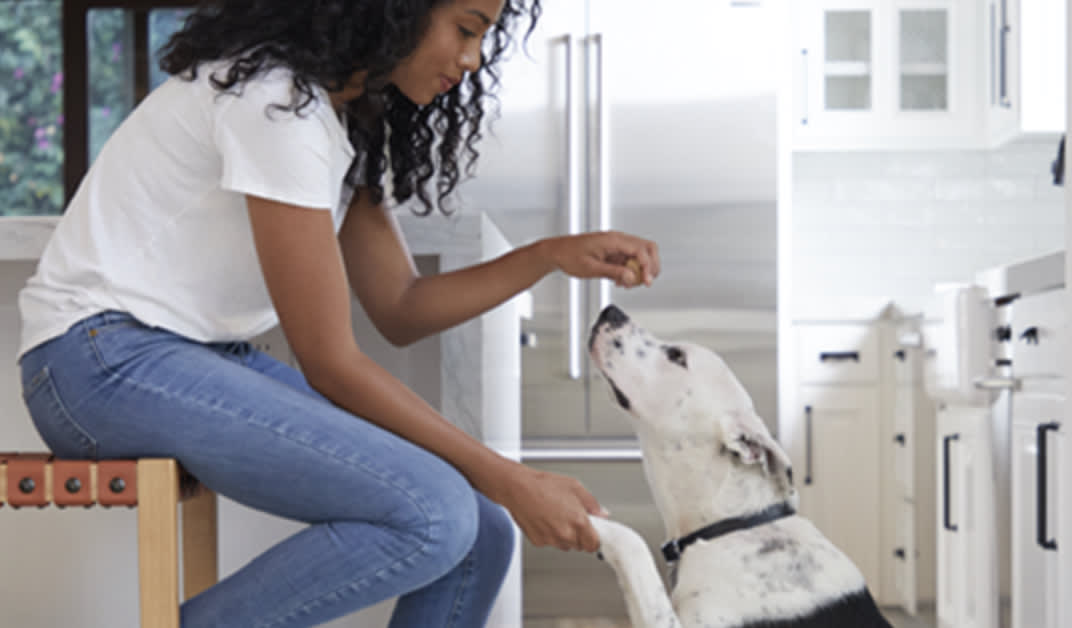Two Easy Ways to Start Earning Rewards!
Become a member today!Members-only pricing and offers, personalized care notifications, Vital Care points back on every purchase and more!Become a credit card member today!
Earn 2X Pals Rewards points at Petco
when you use Petco Pay!APPLY NOWLearn More About Petco Pay Benefits
October 6, 2020
It ends today.
Today, we stop the pain for Buddy because he barks at the doorbell.
We stop the stress for Sadie because she jumps for joy all over the neighbors when they walk in the door.
And we stop the fear for Cooper because he prefers a good pair of sneakers over all the chew toys on the market.
As of today, Petco no longer sells shock collars operated by a person with a remote in hand. Because, as a health and wellness company dedicated to improving pet lives, they have no business in our business.
And frankly, we believe there’s a better way.
So today, we say out with shock collars and in with POSITIVE TRAINING.
We say goodbye to remote controls that cause pain, and hello to expert trainers who mentor pets and pet parents with positivity, patience and compassion.
Today, we call on the rest of the pet industry and anyone who loves pets to join our movement and help us drive positive change beyond just Petco.
Today, we encourage anyone using or looking for shock collars to consider training with treats instead of electricity and partnership instead of pain.
Learn what we're taking off our shelves and add your voice to our petition below. And thank you for always helping us give all pets their very best lives.
Today, we #StopTheShock.

Ron Coughlin
Petco CEO
Training takes positivity
We believe in the power of positive reinforcement training, guided by expert tested methods meant to build trust and support your dog’s physical, social, and mental health.
Darris Cooper
Certified Professional Dog Trainer - Knowledge Assessed (CPDT-KA), Certified National Dog Trainer, Fear-Free Animal Trainer and Evaluator.
Positive Reinforcement backed by experts.

“Positive reinforcement training is key to building lifelong bonds with our pets on a foundation of love and trust. As a veterinarian, I always recommend rewards-based training to pet parents looking for the best ways to keep the entire family healthy and happy together for as long as possible."
Dr. Whitney Miller, DVM, MBA, DACVPM

“Positive reinforcement training is key to building lifelong bonds with our pets on a foundation of love and trust. As a veterinarian, I always recommend rewards-based training to pet parents looking for the best ways to keep the entire family healthy and happy together for as long as possible."
Dr. Whitney Miller, DVM, MBA, DACVPM
Training takes the right tools
We get it, training can be tough. It takes time, patience, and a whole lot of treats. With your choice of in-store or online classes and a range of tools, our certified trainers and in-store associates are here to help you choose what’s best for you and your pup.

Supplies
From barking and chewing to calming and potty training, we have products for every training need.

Positive Reinforcement Training
Virtual or in-store. One-on-one or with a pack. We offer positive training classes for every schedule.
FAQs
We have ended the sale of specific electronic shock collars, a decision that reinforces our commitment to doing what’s best for pets. As a health and wellness company, we believe shock collars have no business being a part of our business. As of October 6, 2020, we've removed all human-activated and bark-activated electronic pet collars, commonly referred to as shock collars, from our in-store and online assortment. Pet parents seeking alternatives to these products are encouraged to try products and services rooted in proven, positive reinforcement training methods.
An electronic collar, often referred to as an e-collar, zap collar or shock collar, is an electronic training tool, most commonly used on dogs. These devices employ a wireless remote (operated by a human) and receiver (attached to the dog’s collar) to deliver electronic stimulation, or waves of electricity, to the pet to identify and deter unwanted behavior. Such collars are considered an aversive or punishment training modality.
Studies have shown that dogs respond effectively to positive, voluntary and rewards-based training, while shock collars have been shown to increase fear, anxiety and stress levels in dogs. At Petco, we have one job: to do what’s right for pets. As part of that commitment, we’re removing specific shock collars from our shelves and supporting total pet health and wellness with expanded positive reinforcement training options. Positive reinforcement is backed by experts and helps build healthy, happy and safe relationships with our pets.
We encourage anyone using or seeking shock collars to consider alternatives that focus on rewards and positive reinforcement, rather than punishment or aversive training methods. Pet parents seeking alternatives to shock collars at our stores will be directed to consult with one of our store partners or Petco-certified trainers for personalized recommendations, ranging from in-store and online, training to positive training aids and products. A pet who needs more advanced behavioral intervention will be referred to their veterinarian or a veterinary behaviorist for evaluation.
We’re removing human-operated and bark-activated shock collars from our shelves because they are in direct opposition to our long-standing commitment to positive reinforcement-based training methods. While we recognize there may be unique circumstances that lead pet parents to seek this kind of training tool, we feel these particular items (human-activated and bark-activated shock collars) present the biggest risk of human error and misuse, even by pet parents with the best of intentions.
As we continue on our journey to support the overall health & wellness of pets, we will continue to review our assortment of products and solutions to help ensure it aligns with our broader mission and values.
Positive reinforcement is backed by experts and helps build bonds between pets and pet parents. The basic theory behind positive reinforcement dog training is that dogs repeat good behavior when it’s followed by a reward. Trainers often use small treats, a toy and/or lots of verbal praise and physical affection to teach dogs they are showing wanted behavior.
Unlike other methods, positive reinforcement does not require physical punishment for unwanted behaviors. Instead, by refusing to reward or acknowledge unwanted behaviors, your pet is less likely to repeat them. Additionally, studies have shown that dogs respond effectively to positive, voluntary and rewards-based training.
Shock collars rely on aversive or punishment-based methods. Aversive training methods, such as shock collars, have been shown to increase fear, anxiety and stress and can slow down (and even stop) pets’ learning experience. Simply put, we believe there’s a better way. Positive reinforcement training methods are backed by experts and meant to build love and trust. We encourage anyone using or seeking shock collars to consider alternatives that focus on rewards rather than punishment, and provide a more positive experience for their pets.
We have a 100% satisfaction guarantee. As such, we will accept the return of any shock collar with a receipt for a full refund. To underscore our commitment to positive reinforcement training methods, we are offering a free introductory online training class for pet parents interested in exploring positive reinforcement training.
We strongly believe that proper training is essential for a healthy, happy and safe relationship with our pets. We encourage anyone using or seeking shock collars to consider alternatives that offer rewards rather than punishment, and provide a more positive experience for their pets. Positive reinforcement builds bonds, love and trust between pets and pet parents. Pet parents seeking alternatives will be directed to consult with one of our store associates or Petco-certified trainers for personalized recommendations—ranging from in-store and online training to positive training aids and products—as well as a veterinarian when appropriate.

